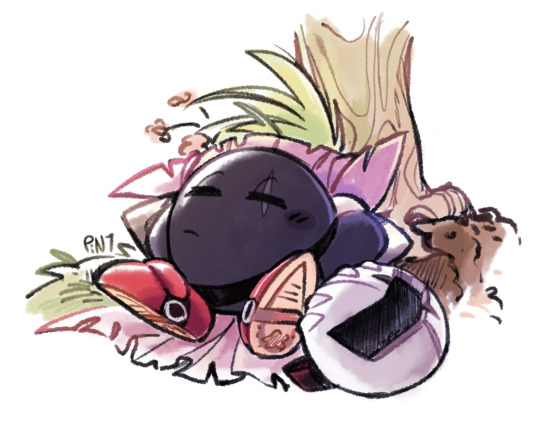#I like to think the mirror world is very pretty despite its perhaps more evil-inclined population
Text

big fan of napping wherever and whenever
#dark meta knight#post's art gallery#kirby#I like to think the mirror world is very pretty despite its perhaps more evil-inclined population#all these great places to rest
608 notes
·
View notes
Text
A Series of Unfortunate Events: Subverting Expectations
To label A Series of Unfortunate Events a children’s novel would be somewhat of a disservice. Yes, the books are heavily marketed towards children but throwing labels out of the window, it becomes clear the author Daniel Handler, guised under the penname Lemony Snicket, wrote the series with a mature audience also in mind.
The books follow a straightforward plot, which gets pretty repetitive in some chapters, but the overarching themes of tragedy, moral complexity, adultism and the author’s knack for clever wordplay and literary, often time, esoteric references are what make A Series of Unfortunate Events more than just a children’s novel. It subverts children’s literature by taking familiar tropes, dousing them with dark humor and absurdist satire then setting them afire with Snicket’s ever popular meta-writing. Throughout the pages, allusions to nonfictional characters and pop culture are scattered, with some cleverly integrated to the story and world-building, two favorites of mine would be Sunny exclaiming “rosebud” as she prompts the group to use a sled as an escape vehicle and a villainous optometrist/hypnotist named Dr. Georgina Orwell. The books are abound with off-kilter reference jokes I begin to worry if it’s too alienating for an average child but then again, maybe such highbrow jokes aren't meant for them to understand now. Perhaps their purposes, other than to prove Snicket is a snob, is to introduce and intensify children's thirst for literature.
Other than flexing his extensive knowledge of books, Snicket also dares to impress with his playful, deliberately skewed writing. There are many instances in the books where Snicket totally abandons conventional narrative structure and gets truly creative with syntax and phrase construction but still cautious enough not to be too jarring. Where else can you find sentences being repeated in order to demonstrate the feeling of déjà vu? What book would have a whole page filled with the word “ever” so as to project strong emphasis? Who else would leave two pages entirely printed in black to show how one is speechless and lost for words? Such willingness to be playful with language and narration mirrors the very sentiment of the whole series: even against the backdrop of darkness, it doesn’t hurt to find time to revel.
Upending established tropes is not the only goal here, Snicket also aims to respect the younger ones instead of patronizing them with black-and-white morality. Good people aren’t entirely exempt from doing bad things the same way bad people are not incapable of goodness. The books’ refusal to adhere to moral dichotomies elevates the series a tier higher than those clichéd feel-good fairy tales for it understands that in real life, there are no princes, princesses, witches or evil stepmothers. As a character succinctly puts it, “People aren’t either wicked or noble. They’re like chef’s salads, with good things and bad things chopped and mixed together in a vinaigrette of confusion and conflict”.
This rings true with our central villain Count Olaf who, from the very start was painted to be a morally corrupt, sinister arsonist who greatly despised reading books. And yet towards the end, when accused of setting the Baudelaire’s house on fire, an event which served as the catalyst for the series, countered it with “Is that what you think?”. Mere seconds later, he even recites poetry as he nears his final moments. These contradictions in character afford Count Olaf a layered complexity suggesting there is more to him than just a villain.
Much like the antagonist, our protagonists also have their fair share of paradoxes. Perhaps my favorite moment in the entire series would be when the three protagonists begin to question their own nobility as they are forced to recount the many instances they had to resort to wicked deeds for the sake of a noble cause. We assume them to be completely innocent while judging Count Olaf as guilty for his actions but in retrospect, the Baudelaire’s have also lied, stolen and even burned down a hospital themselves. A Series of Unfortunate Events succeeds in acknowledging how futile it is when complicated topics like morality are trivialized and relegated into a two-choice dilemma for children’s consumption because the truth is, even adults tend to have a hard time grasping ethics.
With this, Snicket uncovers perhaps one of the gravest mistakes an adult could do to a child: to maintain the illusion that wisdom is something bestowed as time passes which in turn, undermines the child’s ability to examine the world through their lenses and make their own observations. Adults can be just as clueless as a toddler about the world around them; wisdom doesn’t come with age, sometimes it comes with tragedy. This becomes evident as one by one, most of the adults the Baudelaire orphans encounter continue to fail them despite their best efforts and their noblest intentions.
For all its inclination to the grim and macabre, and its tendency to subvert expectations of children’s literature, A Serious of Unfortunate Events functions excellently as a novel series shedding light on the bleak, often unheard of, chaotic phase that is childhood. If what you expect from these 13 novels is an unremarkably-constructed, middle-of-the-road goodness-triumphs-over-villainy story dashed with unearned B-plot romance, topped off with shoehorned life lessons about friendships or some sort then as Lemony Snicket would say, "Look away". While other books in the children’s section are still too concerned dissecting Neverland, A Series of Unfortunate Events is already on its way up there with the classics.
1 note
·
View note